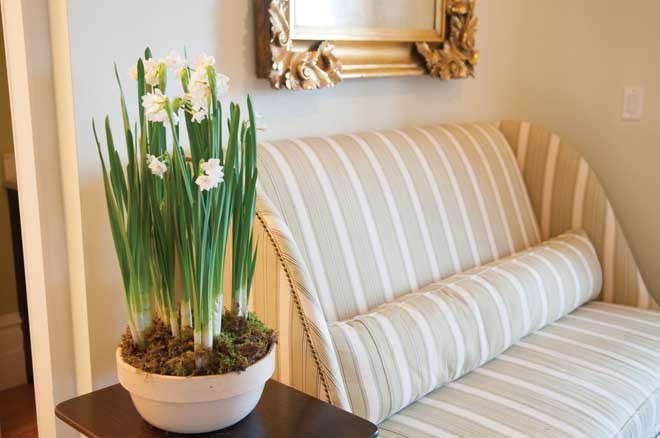I don’t know about you, but I love a rainy November Sunday. I like to light a fire and stretch out on the couch with a good book, or spend time in the kitchen cooking up comfort foods. Warm, dry and snug: for me, it’s pure luxury. What about you? Do you love a rainy Sunday too? Well, I’ve got a few ideas on how you can maximize the cozy factor in your home. These simple touches will make the indoors so inviting you’ll find yourself staying inside even when the sun is shining.
[cozy up]
It’s easy to transform your home as the seasons change by switching out the fabrics and textiles. I always knew colder weather was on the way when my grandmother replaced her sisal rugs with wool ones in the fall. You can warm up a room by changing window treatments and slip covers on your furniture to darker, richer colors and heavier fabrics. Adding a plush throw over a chair or a few soft pillows is a simple, inexpensive way to transform a room.
[bring life indoors]
Shop your yard for bare branches, pine cones and evergreen boughs that you can use to scatter autumn around your home. Just by placing pine cones in a bowl, branches in a vase or evergreens on the mantel, you’ve created a heavenly vignette that keeps you connected with nature.
[flowering bulbs]
Another way to breathe life into your home this fall and winter is with flowering bulbs. Paperwhite narcissus is the most enjoyable flower to cultivate indoors during the cooler months. It can be grown in water, gravel, soil or sand. Plant three to four bulbs in a 6-inch pot with the pointed end facing up and just slightly exposed. Paperwhites like plenty of moisture and light, and a temperature of around 65 degrees. After planting, you’ll have lovely, delicate white flowers in about four to five weeks.
Amaryllis bulbs also are great for growing indoors. Plant one bulb in a container with topsoil up to the shoulder of the bulb, and position it in a warm window. To keep the bulb from rotting, don’t water it until you see some growth. In about six weeks, you’ll have dramatic, colorful blooms.
Feature image by Mark Fonville
[P. Allen Smith, host of two public television programs, is an award-winning designer and gardening expert. He is the author of several books, including his Seasonal Recipes from the Garden.]
